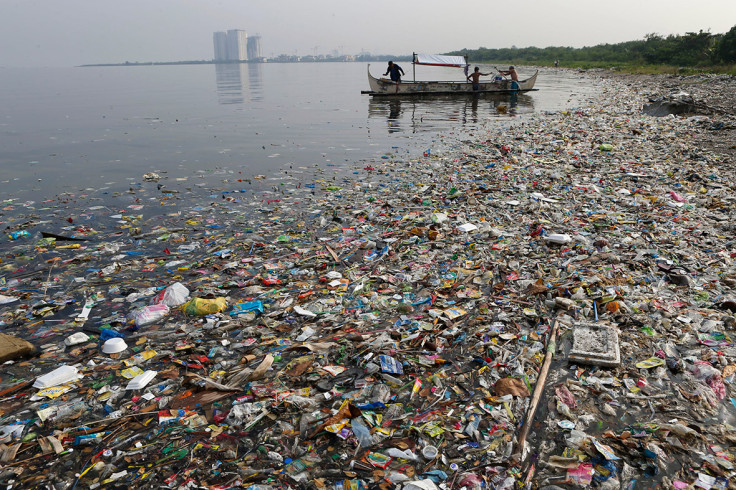I tried to give up plastic for a month - and realised it's impossible
I'm suspicious of people who claim to live plastic-free. Do they use bank cards, public transport, computers or contraception?
There is an estimated 4-12 million metric tonnes of plastic washed into the oceans every year. Between 15 and 40% of plastic thrown away finds its way into the sea. Since plastic was first mass-manufactured, we've made enough of it to wrap the entire planet in cling film.
These are stomach-churning facts. Surely it should be possible to live a comfortable life without throwing away so much ocean-choking plastic? We've been to the moon, sent a rover to Mars, wiped out smallpox – surely it can't be that hard to live without shrink-wrap, polythene bags and disposable food packaging.
As a mostly-vegetarian science journalist writing a lot about ocean pollution and climate change, I felt a surge of guilt every time I picked up a shrink-wrapped broccoli or plastic box of blueberries.
What about the beer can rings I threw away? How many dolphins' noses had I trapped in rubbish? How many seahorses were confusedly carrying my used earbuds around? How many microbeads in my facewash were giving fish indigestion or worse? And what about the carbon dioxide emitted to manufacture this one-time-use piece of rubbish?
I tried to go full one month without plastic. Before trying it yourself, I suggest picking your ground rules.
The first problem I encountered was where to draw the line. Should I avoid absolutely all plastic, not even touch it for a month? I suspected I would be rather quickly unemployed if I took that approach. Typing on a plastic keyboard, picking up a plastic phone handset, dialling plastic buttons, sitting on a plastic chair and using a plastic entry pass were all essential parts of my job.
Vowing not to step onto a plastic Tube or bus floor also makes any kind of public transport around London impossible. I would have to retire my plastic-cased trainers, my fake-leather (plastic) purse, my plastic driving licence, my plastic bank cards? Even cash notes are made of plastic now – could I use money at all? And what about my plastic inhalers? Plastic blister-packs of other medications? My plastic IUD?
I could have done that. I would have been unable to do my job, would have risked an asthma attack and scrapped my long-term contraception. I would have in fact had to abandon all contraception bar the famously hopeless rhythm method. A quick look at the NHS website revealed that the only bona fide method of contraception that didn't involve a plastic device or plastic packaging was permanent sterilisation, which seemed a little drastic.
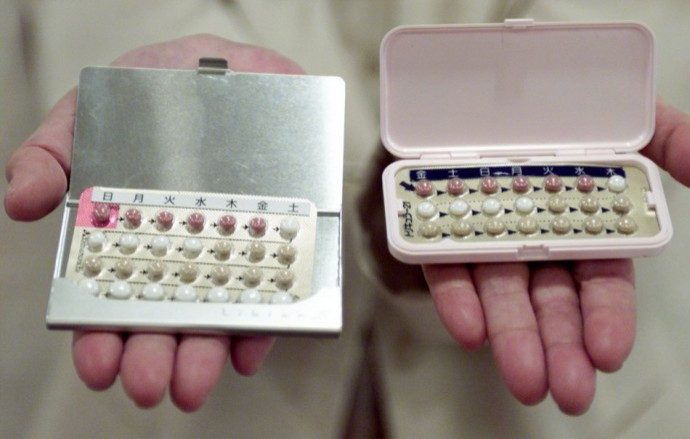
Perhaps a cop-out, but I decided not to go there. I wanted to see how much of my lifestyle I could keep the same while cutting out as much avoidable plastic as possible. I opted to only ban myself from buying any plastic, both recyclable and non-recyclable, that wasn't essential for my job or health.
I also decided not to do any research about plastic-free living before I began. I wanted to see what it was like to wake up and suddenly be unable to buy plastic-wrapped things, without cushioning the transition with spending hours trawling around for advice.
Another choice I made before beginning was not to throw away anything in my remaining cupboards that had plastic on them. I would just refrain from buying any more. Perhaps another cheat, but however bad disposable plastic was, my disposable income was worse.
As a result, my first morning plastic-free was fine. For breakfast I had pitta bread from my half-eaten (non-recyclable plastic) packet, with butter from my half-used (recyclable plastic) tub and gloriously plastic-free eggs in a lovely rustic guilt-free recycled-cardboard box.
On the way to work I noticed more debris on the streets of London than usual and noted the use of my plastic contactless card on the ticket barriers. But otherwise it was uneventful.
But then my mid-morning trip to Pret for coffee was off the menu, and I was suddenly sad. I went down to the shops anyway to see if there was something I could have instead. With envious, bleary eyes I watched the nonchalant passers-by with their horrible disposable coffee cups. I didn't buy anything and sulked back to my desk.
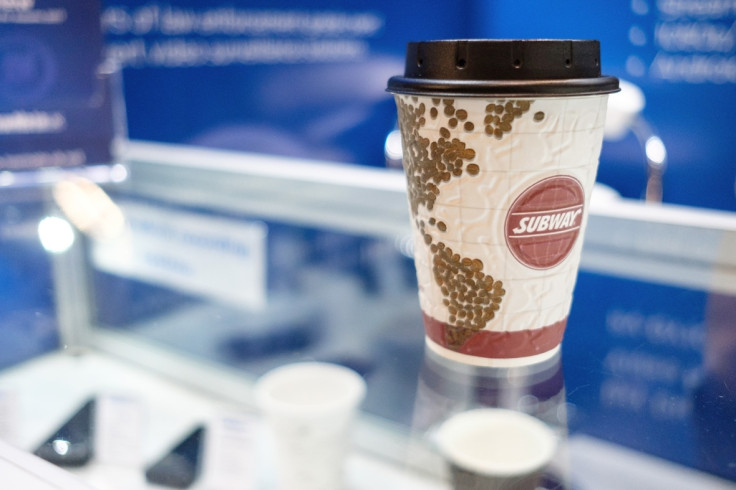
I soon realised that my entire caffeine addiction was on the line. My nearly-empty box of Yorkshire Tea came in a perfectly adequate cardboard box, unnecessarily wrapped in thin, unrecyclable flimsy plastic film. Bags of coffee grounds came in a strange hybrid of foil and plastic and anyway, a cafetiere was made of plastic, and so were those high-maintenance hipster Aeropress contraptions I wasn't really fond of.
For lunch, I went downstairs with a friend – who had thought about joining me on my plastic-free plight, and then thought better of it – to buy some lunch in our usual supermarket. My favourite soup in its plastic tub was off-limits. Everywhere around me delicious food – plump tomatoes, fresh-looking sandwiches, Greek salads, dips and carrot sticks – were all barricaded from me by sheets and sheets of miserable clear plastic.
I opted for a soup in a cardboard carton. It was suspiciously shiny on the outside. Was it cardboard coated with plastic? I couldn't tell. There was no information about the nature of the packaging on the label, other than the recyclable icon. I gave it the benefit of the doubt. Perhaps I'd failed already? But I was hungry, so I bought it and carried on.
What about a bread reall? The bread in the bakery section seemed plastic-free. But the bag I had to put it in was part wholesome-looking brown paper, but with a long clear window of plastic, to make sure you could gaze longingly at the roll you just bought right up until you ate it, I presumed. I picked up a roll with the tongs and then took it with my fingers, feeling dirty and unhygienic but knowing that was irrational. I would pick up the roll with my hands later when eating it anyway.
Furtively, I took it to the self-checkouts without a bag, expecting to be accosted by a disgusted sales attendant all the way. I wasn't. I kept an eye out for anyone else in the busy supermarket doing the same. I didn't see anyone. That was more or less the story of lunch for the entire month, as it was the only thing someone as disorganised and bad at packed lunches as me could buy on the spot without plastic.
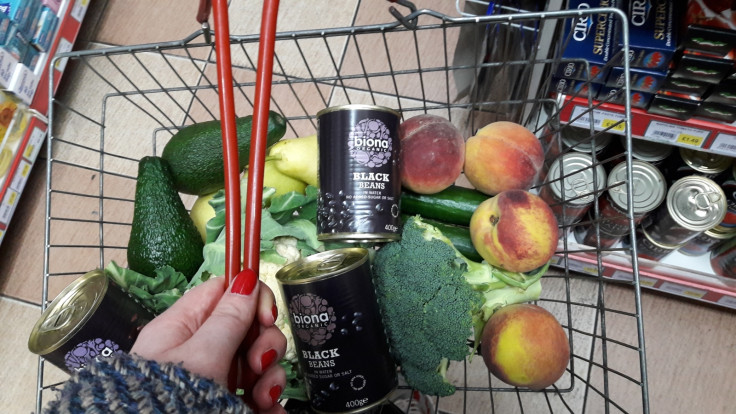
Doing the weekly shopping was harder. All my usual favourites – the blueberries, raspberries, broccoli, spinach, kale, cheese, milk, pitta bread, bagels, hummus, guacamole, lovely little olives stuffed with garlic – were all shrouded in plastic. Even apples and avocados each had a glaring plastic sticker on them. I debated long and hard about whether I was allowed bananas. There's usually only one plastic sticker on a bunch. What if I took the other bananas, not the one with a sticker? I decided that was cheating and went banana-free.
Eggs were a saviour. I had them every day for breakfast. Bread was easily attainable without plastic from bakeries, as long as you avoided the plastic bags to put them in. Butter was also easy, as it came in a papery-metallic wrapping, although I wondered if there was some plastic hiding in there too. Tins of beans were easy. As I was used to fresh or frozen vegetables, I found tins of them disgusting and quickly abandoned that idea.
Afternoon cravings for chocolate were difficult. I couldn't get the small nibble-sized plastic-wrapped chocolate snacks I usually defaulted to. I could buy a fancy paper-and-foil wrapped whole slab of chocolate, but then I would inevitably eat the whole thing in one go. I decided against it.
I found some little corner shops that sold loose vegetables without plastic stickers. I took my own cloth shopping bags around with me without fail.
Household goods and cleaning products were extremely difficult. Thankfully I didn't run out of bin bags or toilet cleaner during my month. I did stop using disposable ear-buds, and found a biodegradable version with paper stems. I thought about buying a bamboo toothbrush when my ordinary plastic one wears out, but didn't get that far. I bought non-plastic-wrapped toilet paper from a friend who had ordered an enormous batch, for about 40p a roll.
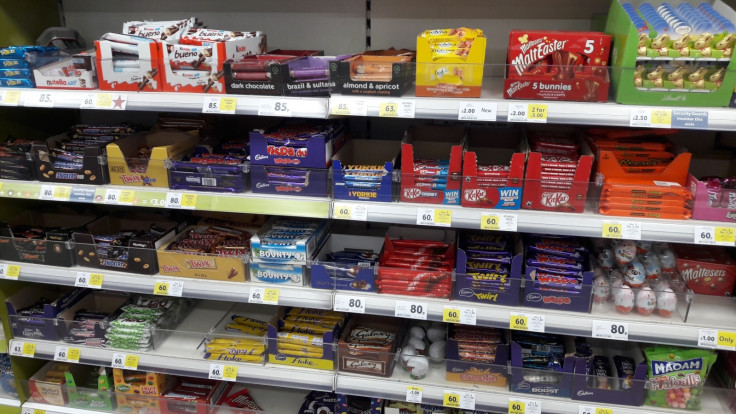
Drinks out were a relief, except for when I was unexpectedly ambushed with a straw in my gin and tonic. Meals out also felt good, until I questioned all the plastic upstream of my dinner. However inviting it looked, everything I was undoubtedly part of a supply chain riddled with plastic.
The hardest part was being out in town and thirsty. When the weather was warm and I was running from work to a stuffy Tube to a date with a friend, I was limited to fizzy drinks in metal cans. A simple bottle of water was out of the question. Throughout the month, I found myself thirstier than I ever remember being in my admittedly extremely privileged life. First world problems. So I waited a while longer to go home and drink tap water.
Other than that, my diet was much more limited than usual. Green veg was hard to come by unless I could make it to the few plastic-free, and not always very nice, shops near me. Salad and most soft fruits were completely out. Perhaps I could have tried harder to seek out specialist shops, but I was busy, lazy and ended up not bothering.
Sometimes I couldn't tell whether something had plastic in or on it. If there was an obvious lid, sheet or label made of plastic that was out. If something papery appeared to be slightly plasticised, I would judge it by whether I could make a discreet tear in it. If it tore like paper, I assumed it was paper. If it didn't, I assumed there was plastic in it. My rule-of-thumb test was probably not 100% reliable, but that's what I went by.
If a friend bought something with plastic in or on it and offered me some, I didn't refuse it. That was mainly a problem because I hadn't thought about it and laid down that rule before starting out. Once I'd done it once, I thought I might as well do the whole month like that. My boyfriend insisted that was cheating, but I wasn't ready to refuse the dinners he made for me when it was his turn.
Also, one morning, I bought a coffee with a disposable plastic lid. It was early, I was on autopilot, I only realised when I was halfway down the street. That was my only indisputable failure. The rest depend on where you draw the line.
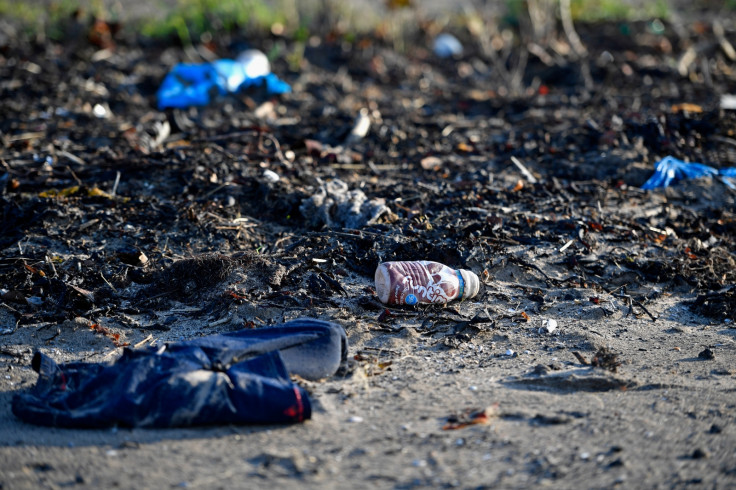
What changed when my month was up? Whether I was imagining it or not, I felt tired and stressed, which I blamed on an insufficiently balanced diet. On the other hand, my caffeine addiction was more or less gone.
I did go back to buying soft fruit and salad vegetables in plastic packaging. For a while I successfully avoided the shrink-wrapped vegetables, before the inconvenience and dietary restriction wore me down. However, I recently happened to move to a house next to a weekly local food market selling plastic-free loose veg in paper bags. At this stage, I have every intention to only buy my vegetables there.
Plastic is endemic in modern life. It's impossible to cut out completely, unless you're willing to take some pretty life-changing steps: stop using bank cards and public transport, abandon computers and most forms of contraception. That's not because plastic is essential. As a species that put one of our own on the moon, biodegradable alternatives are conceivable. But at the moment, ordinary life is built around it, and the oceans, beaches and much of the rest of the natural environment are shouldering the burden.
I have become extremely suspicious of people who claim to live a plastic-free life in the UK. Some of them publish e-books about it. How are you supposed to read an e-book without a plastic-cased e-reader? Or a plastic-cased computer that came wrapped in plastic? What if they're ill? Do they use medicine? Do they drive vehicles or take public transport? Do they use money?
The ideology is brilliant: less plastic, less waste, less pollution, a better planet. But I'm not convinced that with life as we know it in the UK, it's at all possible to live entirely plastic-free. Perhaps it could happen, but it would require going back to a pre-plastic era, with the added difficulty of using no money.
For me, that's too much. I need medicine, contraception, computers and, unfortunately, money in my life. I'm now aiming for a low-plastic option, choosing the plastic-free alternative wherever and whenever it is accessible. I hope as more people try cutting down on plastic, the number of alternatives will grow, to make a minimal-plastic life realistic for more than just the most hard-core, organised and well-researched environmentalist.
